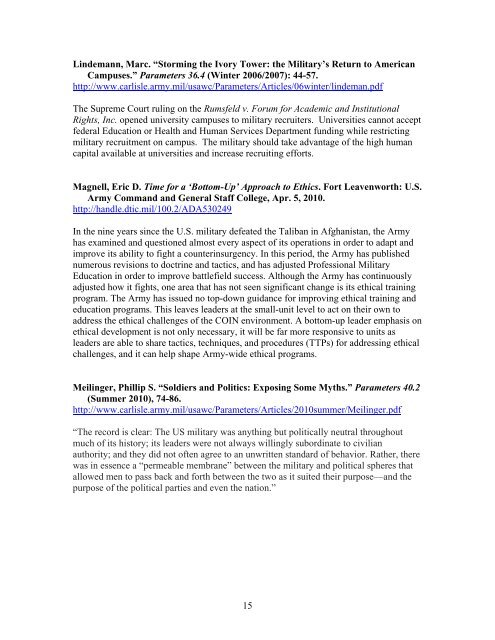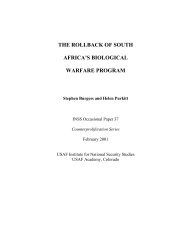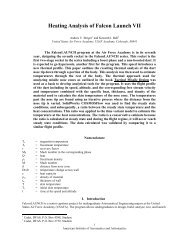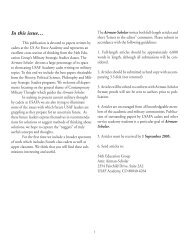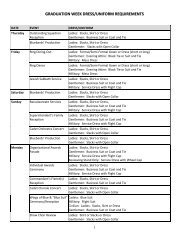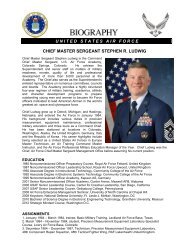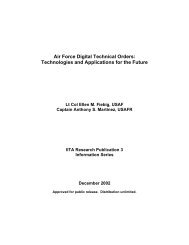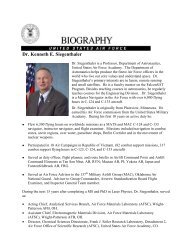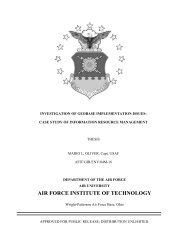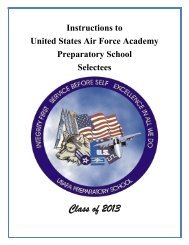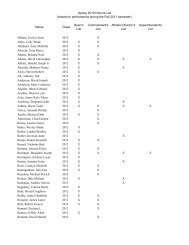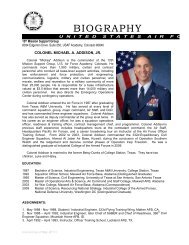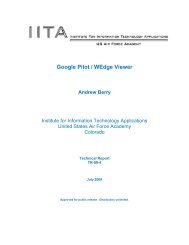Military Professionalism - United States Air Force Academy
Military Professionalism - United States Air Force Academy
Military Professionalism - United States Air Force Academy
You also want an ePaper? Increase the reach of your titles
YUMPU automatically turns print PDFs into web optimized ePapers that Google loves.
Lindemann, Marc. “Storming the Ivory Tower: the <strong>Military</strong>’s Return to American<br />
Campuses.” Parameters 36.4 (Winter 2006/2007): 44-57.<br />
http://www.carlisle.army.mil/usawc/Parameters/Articles/06winter/lindeman.pdf<br />
The Supreme Court ruling on the Rumsfeld v. Forum for Academic and Institutional<br />
Rights, Inc. opened university campuses to military recruiters. Universities cannot accept<br />
federal Education or Health and Human Services Department funding while restricting<br />
military recruitment on campus. The military should take advantage of the high human<br />
capital available at universities and increase recruiting efforts.<br />
Magnell, Eric D. Time for a ‘Bottom-Up’ Approach to Ethics. Fort Leavenworth: U.S.<br />
Army Command and General Staff College, Apr. 5, 2010.<br />
http://handle.dtic.mil/100.2/ADA530249<br />
In the nine years since the U.S. military defeated the Taliban in Afghanistan, the Army<br />
has examined and questioned almost every aspect of its operations in order to adapt and<br />
improve its ability to fight a counterinsurgency. In this period, the Army has published<br />
numerous revisions to doctrine and tactics, and has adjusted Professional <strong>Military</strong><br />
Education in order to improve battlefield success. Although the Army has continuously<br />
adjusted how it fights, one area that has not seen significant change is its ethical training<br />
program. The Army has issued no top-down guidance for improving ethical training and<br />
education programs. This leaves leaders at the small-unit level to act on their own to<br />
address the ethical challenges of the COIN environment. A bottom-up leader emphasis on<br />
ethical development is not only necessary, it will be far more responsive to units as<br />
leaders are able to share tactics, techniques, and procedures (TTPs) for addressing ethical<br />
challenges, and it can help shape Army-wide ethical programs.<br />
Meilinger, Phillip S. “Soldiers and Politics: Exposing Some Myths.” Parameters 40.2<br />
(Summer 2010), 74-86.<br />
http://www.carlisle.army.mil/usawc/Parameters/Articles/2010summer/Meilinger.pdf<br />
“The record is clear: The US military was anything but politically neutral throughout<br />
much of its history; its leaders were not always willingly subordinate to civilian<br />
authority; and they did not often agree to an unwritten standard of behavior. Rather, there<br />
was in essence a “permeable membrane” between the military and political spheres that<br />
allowed men to pass back and forth between the two as it suited their purpose—and the<br />
purpose of the political parties and even the nation.”<br />
15


